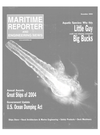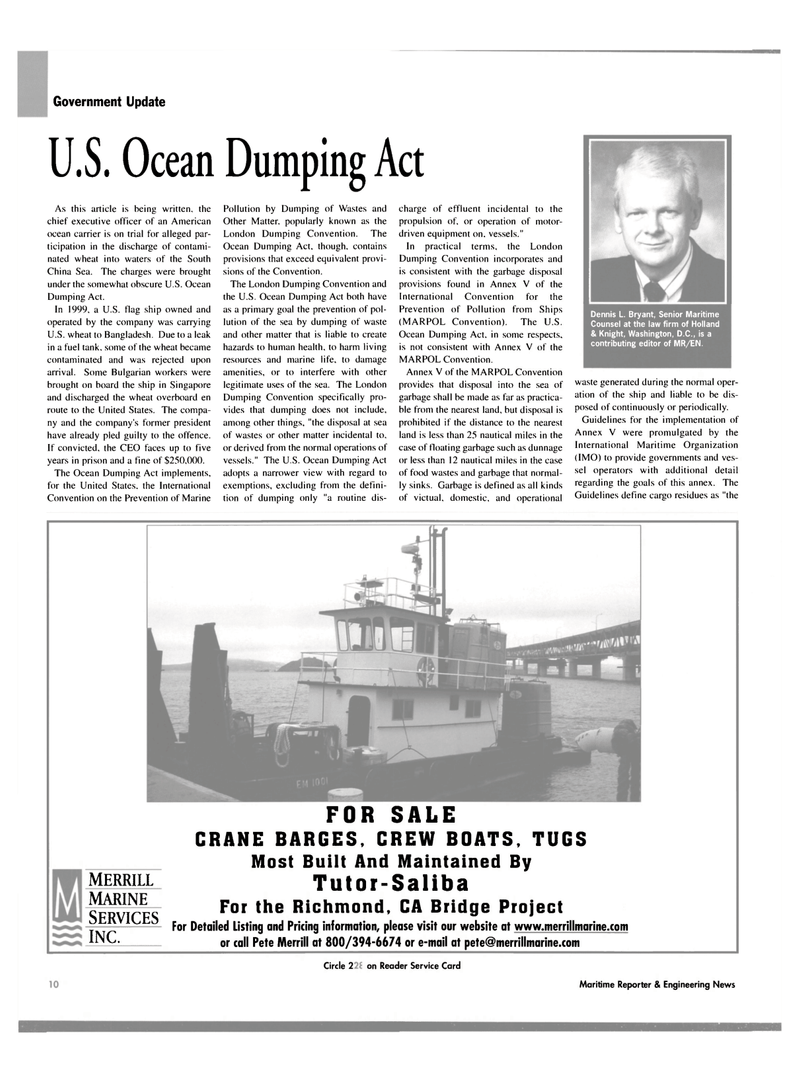
Page 10: of Maritime Reporter Magazine (December 2004)
Great Ships of 2004
Read this page in Pdf, Flash or Html5 edition of December 2004 Maritime Reporter Magazine
Government Update
U.S. Ocean Dumping Act
As this article is being written, the chief executive officer of an American ocean carrier is on trial for alleged par- ticipation in the discharge of contami- nated wheat into waters of the South
China Sea. The charges were brought under the somewhat obscure U.S. Ocean
Dumping Act.
In 1999, a U.S. flag ship owned and operated by the company was carrying
U.S. wheat to Bangladesh. Due to a leak in a fuel tank, some of the wheat became contaminated and was rejected upon arrival. Some Bulgarian workers were brought on board the ship in Singapore and discharged the wheat overboard en route to the United States. The compa- ny and the company's former president have already pled guilty to the offence.
If convicted, the CEO faces up to five years in prison and a fine of $250,000.
The Ocean Dumping Act implements, for the United States, the International
Convention on the Prevention of Marine
Pollution by Dumping of Wastes and
Other Matter, popularly known as the
London Dumping Convention. The
Ocean Dumping Act, though, contains provisions that exceed equivalent provi- sions of the Convention.
The London Dumping Convention and the U.S. Ocean Dumping Act both have as a primary goal the prevention of pol- lution of the sea by dumping of waste and other matter that is liable to create hazards to human health, to harm living resources and marine life, to damage amenities, or to interfere with other legitimate uses of the sea. The London
Dumping Convention specifically pro- vides that dumping does not include, among other things, "the disposal at sea of wastes or other matter incidental to. or derived from the normal operations of vessels." The U.S. Ocean Dumping Act adopts a narrower view with regard to exemptions, excluding from the defini- tion of dumping only "a routine dis- charge of effluent incidental to the propulsion of, or operation of motor- driven equipment on, vessels."
In practical terms, the London
Dumping Convention incorporates and is consistent with the garbage disposal provisions found in Annex V of the
International Convention for the
Prevention of Pollution from Ships (MARPOL Convention). The U.S.
Ocean Dumping Act, in some respects, is not consistent with Annex V of the
MARPOL Convention.
Annex V of the MARPOL Convention provides that disposal into the sea of garbage shall be made as far as practica- ble from the nearest land, but disposal is prohibited if the distance to the nearest land is less than 25 nautical miles in the case of floating garbage such as dunnage or less than 12 nautical miles in the case of food wastes and garbage that normal- ly sinks. Garbage is defined as all kinds of victual, domestic, and operational
Dennis L. Bryant, Senior Maritime
Counsel at the law firm of Holland & Knight, Washington, D.C., is a contributing editor of MR/EN. waste generated during the normal oper- ation of the ship and liable to be dis- posed of continuously or periodically.
Guidelines for the implementation of
Annex V were promulgated by the
International Maritime Organization (IMO) to provide governments and ves- sel operators with additional detail regarding the goals of this annex. The
Guidelines define cargo residues as "the
MERRILL
MARINE
SERVICES
INC.
FOR SALE
CRANE BARGES, CREW BOATS, TUGS
Most Built And Maintained By
Tutor-Saliba
For the Richmond, CA Bridge Project
For Detailed Listing and Pricing information, please visit our website at www.merrillmarine.com or call Pete Merrill at 800/394-6674 or e-mail at [email protected]
Circle 205 on Reader Service Card 12 Maritime Reporter & Engineering News

 9
9

 11
11
